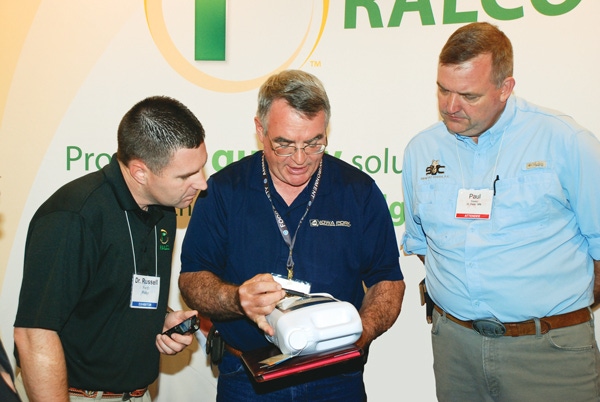DE-Lyte is a liquid nutritional supplement that helps ease pig transitions from the sow to the nursery at weaning time. Russell Fent, Ralco Animal Health, explained, “Typically it takes just over two days for 95% of pigs to come onto feed once they enter the nursery. DE-Lyte is fortified with vitamins D and E to support the young pigs’ transitioning immune system and promote healthy bone development.”

DE-Lyte is a liquid nutritional supplement that helps ease pig transitions from the sow to the nursery at weaning time. Russell Fent, Ralco Animal Health, explained, “Typically it takes just over two days for 95% of pigs to come onto feed once they enter the nursery. DE-Lyte is fortified with vitamins D and E to support the young pigs’ transitioning immune system and promote healthy bone development.”
DE-Lyte is also formulated to help get pigs on feed quickly. An acidifier in the product helps improve gut heath, according to Fent. “As the pig moves from a milk diet to a grain-based diet, the gut becomes less acidic, which makes it more susceptible to pathogens,” he said.
The product contains ActiFibe, a probiotic fiber that helps promote healthy gut microflora. DE-Lyte also provides electrolytes to keep pigs hydrated through the transition process at weaning. The strawberry flavor helps improve intake. The product is sugar-free.
Fent said that one gallon of DE-Lyte should be mixed with four gallons of water to make a stock solution. “Meter one ounce of stock solution per gallon of drinking water and use for five to seven days on newly weaned pigs or during times of stress,” he said.
Leon Sheets asked, “Is this product user-friendly and easy to maintain in equipment, or will it create sludge in a medicator?”
Fent answered that the prebiotics in the solution serve as a good emulsifier that helps keep it in suspension, thus no special cleaning is needed. “We still suggest going into the solution to stir it every day, but it shouldn’t cause a problem,” he said.
Sheets also wondered if antimicrobials could follow this product and whether it would be temperature-sensitive during storage.
Fent said DE-Lyte has been tested in the lab to check compatibility. Most antimicrobials would not cause a problem when mixed with the stock solution, with the exception of sulfa drugs, which should not be used with the product.
DE-Lyte should be used within five days if it is mixed and in the medicator. “We provide a chart with information about which drugs are compatible,” Fent added.
Lab tests have indicated vitamins D and E are stable even if the container is opened. “We have tested it in the lab at temperatures up to 100°F and have conducted freeze-thaw cycle testing, and the product was stable both at 100°F and during the freeze-thaw testing,” Fent noted.
Ted Funk and Marcia Shannon inquired about feed and water intake testing and data. “We have done research trials in which pigs using this product were 1 lb. heavier at 21 days, compared to pigs that were not using the product, even though feed intake was similar. We did not measure water intake during that trial,” Fent said.
The retail price for DE-Lyte is $62.99/gal. Regarding the price, Sheets noted, “Seven to 10 cents per pig is not a huge cost for this product.” Shannon agreed, saying, “The beauty is that it is more than just the vitamins D and E; if the product helps the pigs to start drinking, that’s very helpful,” Paul Yeske concurred, “The flavor probably helps attract the pigs to the water. And the fact that there is not added sugar is good.”
Yeske continued, “I think there is still a lot of work to be done regarding the issue of vitamin D deficiency in pigs, and this looks like a producer-friendly product that is not expensive.”
“This is a protocol a producer could work into their production system without a lot of extra labor,” Funk said. “It seems to work well with the medicator, too.”
Learn more about Ralco DE-Lyte at www.ralconutrition.com.
About the Author(s)
You May Also Like



